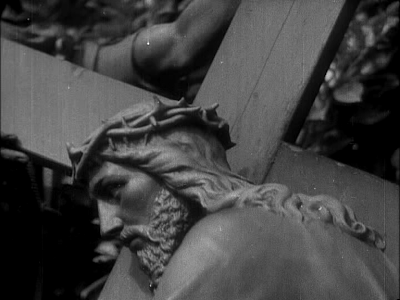Director: Charles Dekeukeleire
Year: 1932
Time: 13 mins
Music
Annelies Van Parys
Els Mondelaers
Hermes Ensemble
Eye of Sound: The camera approaches its object carefully and it takes some time before we can have a glimpse of the site itself. After some shots of the sky, the mountains, and plenty of water - perhaps not entirely devoid of religious significance - we finally enter the Grotto. But we won't spend much time there, for Dekeukeleire is more interested in the surrounding social and psychological scapes than in the original site of the Virgin's appearance. Dekeukeleire was himself a catholic, but this visual documentary on Lourdes is rather ambiguous as to his position regarding the most important pilgrimage site in Europe after the Vatican. There is a focus on the diseased who come praying for cure, on the peasants who lay offerings everywhere, on the selling of religious articles around the site, and on the "temporal" aspects of faith - but it's not easy to grasp a clear position from the director. Knowing whether Visions of Lourdes is intended as a piece of criticism on such practices or not is a question that entertained critics for decades, so much so that it obscured the film's' beautiful cinematic composition, its sense of spatial and temporal movement, and especially the strange recurrence of some elements apparently alien to the site - namely, the constant presence of water in all its forms. Van Parys' beautiful soundtrack perhaps adds to the ambiguity, although I suspect that ears less accustomed to contemporary music can hardly fail to associate its occasional dissonant lines with the idea of the sinister. Effusive, almost ecstatically candid games between Els Mondelaers' voice and the wind and string sections are interspersed with more sombre and reflexive passages verging on dissonance; but the score makes use of some common religious themes and recurrent, almost lyrical phrases lend it a sense of lightness that is increasingly rare in contemporary composition. Literary critic William Empson insisted on the creative and cognitive virtues of ambiguity. Visions of Lourdes is indeed an ambiguous film, but maybe part of its compelling beauty lies precisely there.
http://rapidshare.com/files/387040909/lourdes.mkv.001
http://rapidshare.com/files/387040895/lourdes.mkv.002
http://rapidshare.com/files/387040895/lourdes.mkv.002




Many thanks for this one
ReplyDelete;)
Great post much appreciate the time you took to write this.
ReplyDelete